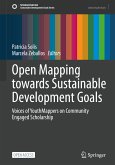This open access book critically examines discussions on digitalisation and individual opportunities for socio-economic advancement. Contrary to the prevailing narratives of "digital empowerment" and opportunities for every individual, this book argues that digitalisation massively curtails social advancement opportunities, consolidating existing social relations. From a spatial perspective, Scheffer demonstrates how socially disadvantaged groups are faced with reproducing mechanisms as part of a new data economy. Surprisingly, the more intensively digital services are used, the more this happens.
Building on Löw´s sociology of space and Bourdieu´s concept of habitus, this book shows how practices of social exclusion are transferred to the digital present in an innovative way. The image of "mirrored" spaces describes a new mechanism that explains social exclusion in the age of digitalisation. This book is an essential resource for researchers and students interestedin socio-economic inequalities, processes of digitalisation, and digital geographies.
Building on Löw´s sociology of space and Bourdieu´s concept of habitus, this book shows how practices of social exclusion are transferred to the digital present in an innovative way. The image of "mirrored" spaces describes a new mechanism that explains social exclusion in the age of digitalisation. This book is an essential resource for researchers and students interestedin socio-economic inequalities, processes of digitalisation, and digital geographies.








